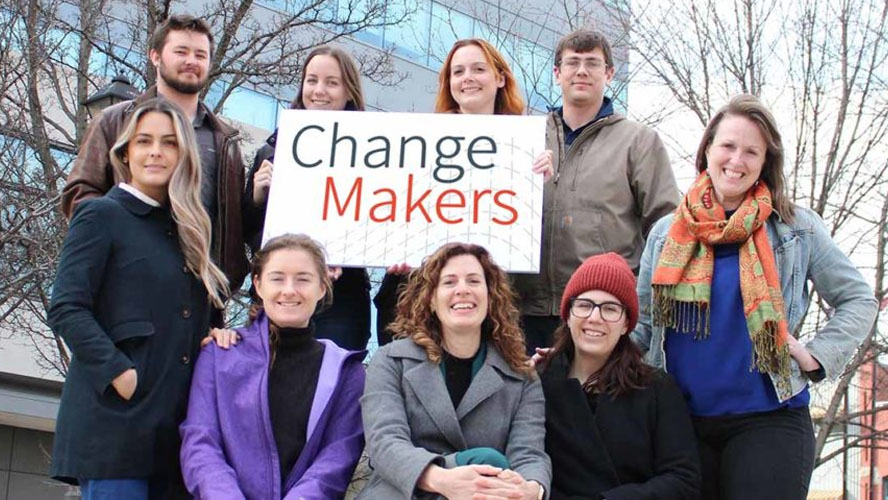In the fight against climate change, women bring unique understanding and critical leadership traits
Studies show that women have a generational worldview; that is, a natural ability to see society and various intergenerational aspects in motion, allowing them to think more about horizons that span further than their own generation. This topic was recently featured in the National Post as part of the Future of Our Planet campaign, and is further explored in recent studies and reports.
But what does a generational worldview entail? And how is it relevant in reducing our carbon footprint and combating climate change?

What is a generational worldview?
Women, in general, tend to present an intrinsic ability to understand social and intergenerational dimensions. They think in terms of time horizons that span the lives of their children and grandchildren.
In developing countries, there’s reported evidence showing women as key combaters of resource loss and food insecurity, and cases of women playing a vital role in dealing with disasters by effectively mobilizing their community toward concrete ways of reducing risk, managing risk, and adapting. This is linked to their cultural and practical knowledge of the environment and resource conservation. [1]
These innate instincts and skills are indispensable when dealing with complex social and environmental challenges because they present an inherent way of thinking forward. By thinking outside of ourselves and putting the focus on our children, we put our value on the future rather than the present. And with nearly half of the world’s population living in areas that are highly vulnerable to climate change—exposing them to more frequent weather disasters, food and water shortages, and vector-borne diseases—a call to action has never been more warranted.
Simply put, women offer a plurality of perspective that cannot be ignored.
Others think in terms of generations as well. The worldview of many of our Indigenous peoples here in Canada apply “seventh-generation decision-making.” This process effectively considers how future generations will be impacted by the decisions we’re making today; it brings future generations to the forefront and gently shifts the focus to include a worldview outside of our own narrow scope.
Taking a vast viewpoint in decision-making is needed when it comes to challenges like climate change. We must ask ourselves this: When I step back and think about what the world will look like in seven generations, what do I see?
Women in leadership, and what this means for the energy transition and combating climate change
As the world is doubling down on effort in combating climate change, the energy value chain is undergoing an extreme transformation. As a result, new paradigms are emerging and challenging the way energy is being generated, distributed, and used. It's an exciting time, and one calling for more contributions from women, as women’s leadership style can make them formidable agents of change.
Many studies have been conducted on women in leadership. The 2007 McKinsey & Company study “Women Matter” is well known for its comprehensive examination of the concrete business and organizational performance benefits of having more women in top leadership roles. [2]
The study demonstrated that business and organizational performance was conditional to having the management display nine key leadership behaviors. Of these nine key behaviors, half of them were more natural for men, and the other half were more often applied by women. In other words, women and men tend to have fundamentally different leadership styles and a varying approach to tackling complex issues. Both leadership styles are vital in creating and implementing positive change, and interestingly, the study deduced that the leadership behaviors found more frequently in women than among men are crucial for meeting complex emerging and future challenges.
The same behaviors have been observed by the World Bank/United Nations as the root identifiers of women as positive “agents of change” in other areas, such as micro-loan management, the fight against extremism, and combatting resource loss and increasing food security in developing countries. These key behaviors include:
- a strong belief that they can make a difference
- an ability to turn adversity into learning opportunities
- an ability to learn by co-operating
- a persistence in building relationships to reach goals
- a willingness to challenge the status quo for the sake of the greater good
- an ability to understand social and inter-generational aspects
- a resilience based on a combination of adaptive and innovative capacities in the face of demanding challenges
The latest Intergovernmental Panel on Climate Change (IPPC) report: a red-code warning
Climate change is without a doubt the greatest environmental challenge we’re facing. We know this already, but the recent release of the IPCC report is another grim reality check. The report is a red-code warning showing that if we miss the Paris Agreement targets, climate change will result in irreversible losses much earlier than previously thought, and reminds us that there is no place on earth immune to it. [3]
And so, as we shift our focus to solutions, we need to consider tangible ways that everyone can affect change.
Hatch is currently characterizing life-cycle carbon emissions and energy efficiency in project development to inform material selection and design. Characterizing and improving our understanding of the various sources of carbon emissions from a life cycle perspective (from material extraction to final disposal) informs the kind of cost/benefit analysis that clients need to support their decision-making, and to reach their goals surrounding energy transition and reaching net-zero.
Ask us how we can support you to assess opportunities, identify your climate change strategies, and develop a plan of action.
